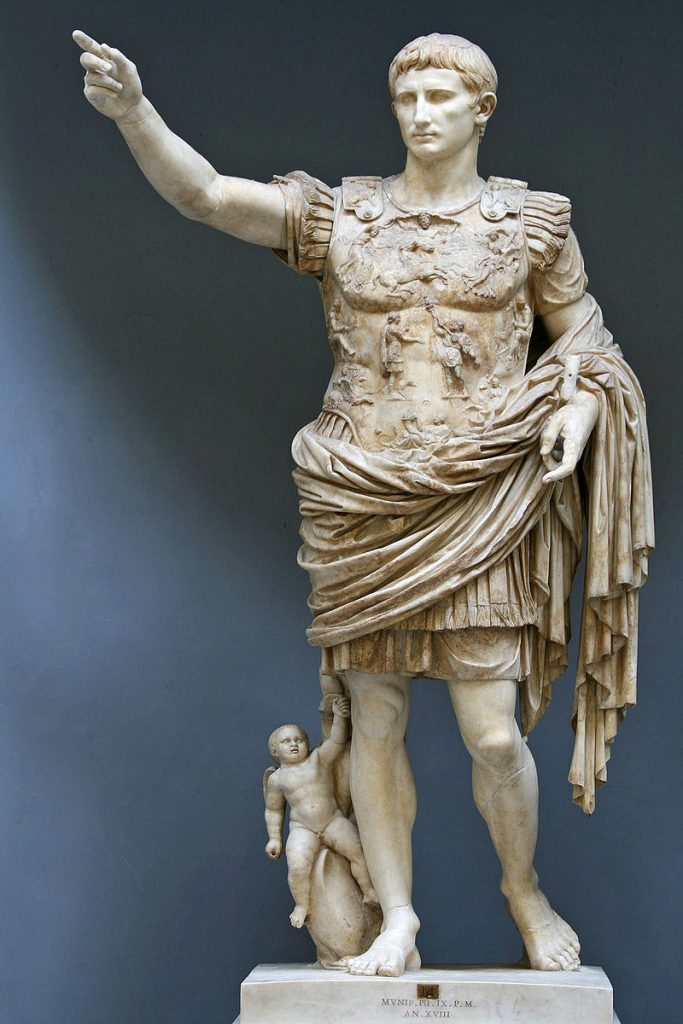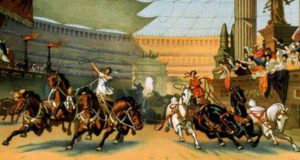Forty-five years of unopposed rule seems an unlikely feat for any ruler in Roman history. After a civil war that lasted thirteen years, treachery, and chaos, Rome finally had an emperor it could count on. Rome’s first emperor was born as Gaius Octavius in 63 B.C.E. His family was unlike any other in Rome at the time; they were humble and kind to say the least.1 After the late dictator of the fallen Republic, Julius Caesar, adopted and named Octavian his heir in 45 B.C.E., he was thenceforth renamed Gaius Julius Caesar. His name was changed again in 27 B.C.E. to Augustus Caesar by the Senate.2 It was with this name Augustus was remembered for, and he stayed in power for decades. Augustus stayed in power for so long because he was intelligent, refused extravagant titles, was recognized as god-like, and single handedly restored Roman architecture and government.

While trying to consolidate his power in Rome after Caesar’s assassination, Augustus looked to Marc Antony, then in Egypt, as an ally, and formed the Second Triumvirate with him and Marcus Aemilius Lepidus. Their shared power inevitably led to differences, but Augustus stayed level-headed, and intelligently went around Antony’s and Lepidus’s authority. Together, they defeated the last of the Republic forces and Sextus Pompeius (son of Pompey the Great).3 Soon after, Augustus and Marc Antony split up the Roman Empire and co-ruled, until Augustus caught wind that Antony was planning on creating an independent monarchy in Asia Minor. Seeing an upper hand in this situation, Augustus exposed Marc Antony’s intentions to the Senate. This led to Rome seeing Antony’s actions as an act of war, and the Senate did not hesitate to declare war on Antony and Cleopatra in 32 B.C.E. This act ultimately led to the demise of Egypt’s last Ptolemaic rulers, since Antony and Cleopatra committed suicide before being captured by Roman soldiers. Without Augustus’s intelligence, Rome might have had another civil war on its hands, had Antony been able to take control of Rome. The defeat of Antony gave Augustus complete power over Rome and its people.
Fearing another civil war, Augustus steered clear of naming himself as dictator or sole leader; instead, he took upon himself the role of consul or tribune. For thirteen consecutive terms, Augustus remained as head of the Roman Empire and refused extravagant titles. He was often called princeps, or “first citizen.” This name delivered the image Augustus wanted to uphold. His identification with the common people of Rome is what made his rule accepted in Roman society. Even when Augustus was given supreme power, he wanted to be called princeps and continued to defer to the Senate to keep the peace.4
Many of Augustus’s subjects saw him as god-like. Halley’s Comet was said to have appeared during the beginning of his reign, and Augustus claimed it was Julius Caesar’s spirit going to heaven. Rumor had it in Rome that if this were true, then Caesar was a god, which would make Augustus the son of a god.5 In addition to Augustus’s public persona, he hesitated to remove any who were unfit to serve beneath him. He routinely removed and exiled from his Empire any who threatened his legacy. He was swift and just in the actions he took with any who violated Roman law or morals. For example, after making adultery illegal in Rome, Augustus is said to have sent his daughter into exile for adulteries she committed.6
Make Rome Great Again would have been a just campaign slogan for Augustus. He did exactly that by restoring Rome’s architecture and government. In the autobiography by Augustus called, “Res Gastae Divi Augusti,” which translates as the deeds of the divine Augustus, Augustus tells of his good deeds to Rome throughout his reign as Emperor. In this autobiography, Augustus claims to have restored “eighty-two temples of the gods in the city by the authority of the senate.”7 It is said that Augustus found Rome as a city of brick and made it a city of marble. He also kept the Pax Romana, or Roman peace, alive and well throughout his rule. This led to an improved economy and caused the arts to flourish. Some lasting artists from Augustus’s rule include Horace, Ovid, Livy, and Vergil. The Senate was grateful for all of Augustus’s achievements for Rome, and they gave him the title of pater patriae—father of his country in 2 B.C.E.8
Through his ambition and expertise, Augustus single-handedly made Rome one of the greatest empires of all time. The amount of time Augustus ruled was unparalleled in the history of Rome. Augustus successfully kept his power with his military intelligence, refusing extravagant titles, being seen as god-like by Rome, and making Rome peaceful and prosperous.
- Patricia Southern, Augustus (Roman Imperial Biographies) (New York: Routledge, 2013), 6. ↵
- Salem Press Biographical Encyclopedia, September 2015, s.v. “Caesar Augustus,” by Michael Witkoski. ↵
- Salem Press Biographical Encyclopedia, September 2015, s.v. “Caesar Augustus,” by Michael Witkoski. ↵
- Ancient History Encyclopedia, August 2010, s.v. “Augustus,” by Joshua J. Mark. ↵
- Nandini Pandey, “Caesar’s Comet, the Julian Star, and the Invention of Augustus,” Transactions of the American Philological Association, vol. 143, no. 2 (2013): 407. ↵
- Salem Press Biographical Encyclopedia, September 2015, s.v. “Caesar Augustus,” by Michael Witkoski. ↵
- Thomas Bushnell, The Deeds of the Divine Augustus, transl. Thomas Bushnell (Cambridge, Mass: Internet Classics Archive, 1996), 20. ↵
- Salem Press Biographical Encyclopedia, September 2015, s.v. “Caesar Augustus,” by Michael Witkoski. ↵



43 comments
Alexander Manibusan
I never knew that Augustus was such a benevolent ruler. Then again, it was under his rule that the Pax Romana flourished. I am impressed that he managed not to create another civil war even when the second triumvirate was falling apart. And to be so popular with the people of Rome is equally impressive. Although the people didn’t mind having an emperor, exactly why did they abandon the ways of the Republic? Did it simply not work or was there another reason?
Christopher Vasquez
Augustus was a skilled military tactician and politician. Creating a Triumvirate to keep the peace was a great idea; however, I wonder if he became part of the 2nd Triumvirate knowing that he would be the last man standing, and, as a result, the sole ruler. Exposing Marc Antony’s plan to make an independent monarchy in Asia minor was a great political move; it allied him with the senate and people of Rome, making Antony the villain. Augustus was also very wise to become consul rather than call himself dictator. Fearing another civil war, he chose the title of “Princeps,” which was another intelligent move; it kept the citizens and Senate from becoming too wary of him. Augustus was also, as the article makes him appear, a just ruler who obeyed his own laws (he exiled his daughter). All in all, he seems to have been a great leader.
Christopher Hohman
Nice article. It is amazing how Octavian was able to consolidate power to himself. A reign that lasted 45 years was unprecedented at the time. Undoubtedly Octavian did a lot of things right. He invested in new public works like the temples he restored, he was a successful conqueror, and he claimed to be divine. All the right ingredients for a stable and strong leader of a large state like Rome. I also wonder how things might have been different if Marc Antony had won the civil war,
Timothy ODekirk
The story of Augustus is truly interesting and inspiring. Augustus was seen as one of Rome’s most powerful and successful ruler and for good reason. I found the goal of Augustus interesting when he said that his plan was to change Rome from brick into marble. I also found it interesting how the economy of Rome flourished. Augustus was also a well known individual to the Roman people and was highly respected. The story of Augustus is a story that will be forever interesting and intriguing to article readers like myself.
Samuel Stallcup
In the video game Sid Meier’s Civilization V, I always play as Augustus Caesar, and this article does a good job at expressing why he was such a great emperor and leader. It’s interesting that he sought help from other leaders in other countries, and used many resources that he had available to him. His attempt to relate with the common citizen in Rome is also key to what kept him accepted by many people.
Rebekah Esquivel
Rome and its history has always been a very complex yet very interesting topic for me. Before reading this article I had never heard of Augustus and his impact in Roman history. He was a very smart man and didn’t want people to see him as being superior to others. He was able to gain his power through equal treatment which is not something typically seen within history. Many ways to power were gained through force and separation of powers. It is always nice to see someone do something good within history the proper way and now forcing their ways into a position they really do not deserve. Very well written and informative article!
Aaiyanna Johnson
I love reading about the Romans and their history, so it wasn’t very hard for me to select this article. I didn’t know Antony and Lepidus, the same people who conspired against Julius Caesar. This shows how patient and mature he was, to understand the impact they would have on helping him. He was very fair, he even exiled his daughter. He treated everyone the same.
Sebastian Castro Ramos
Augustus was a very astute ruler. He managed to be perceived as a god to his people, and he did not accept titles that glorified him in order to keep the people feeling he was the princeps, another citizen just like them. He also managed to get all the power of the triumvirate for himself and avoided a civil war after doing it. Excellent article, great flow of ideas.
Karina Nanez
Rome as an empire was extensive and complex and you have done an amazing job showing that its political history is just as complex as is culture. The shift from lawlessness to order and the comparison of Augustus Caesar to Julius Caesar and to a god, it shows that he was able to fully comprehend how significant his actions were in times of tension and civil war.
Cristian Medina-Lopez
I thought this article was well written keeping the reader interested the whole time. I found it very interesting how Augustus, someone who had no one first hand to follow, was able to lead many in Rome. What I really liked about him was how he kept the law the same for everyone, even his own daughter, who he exiled himself.